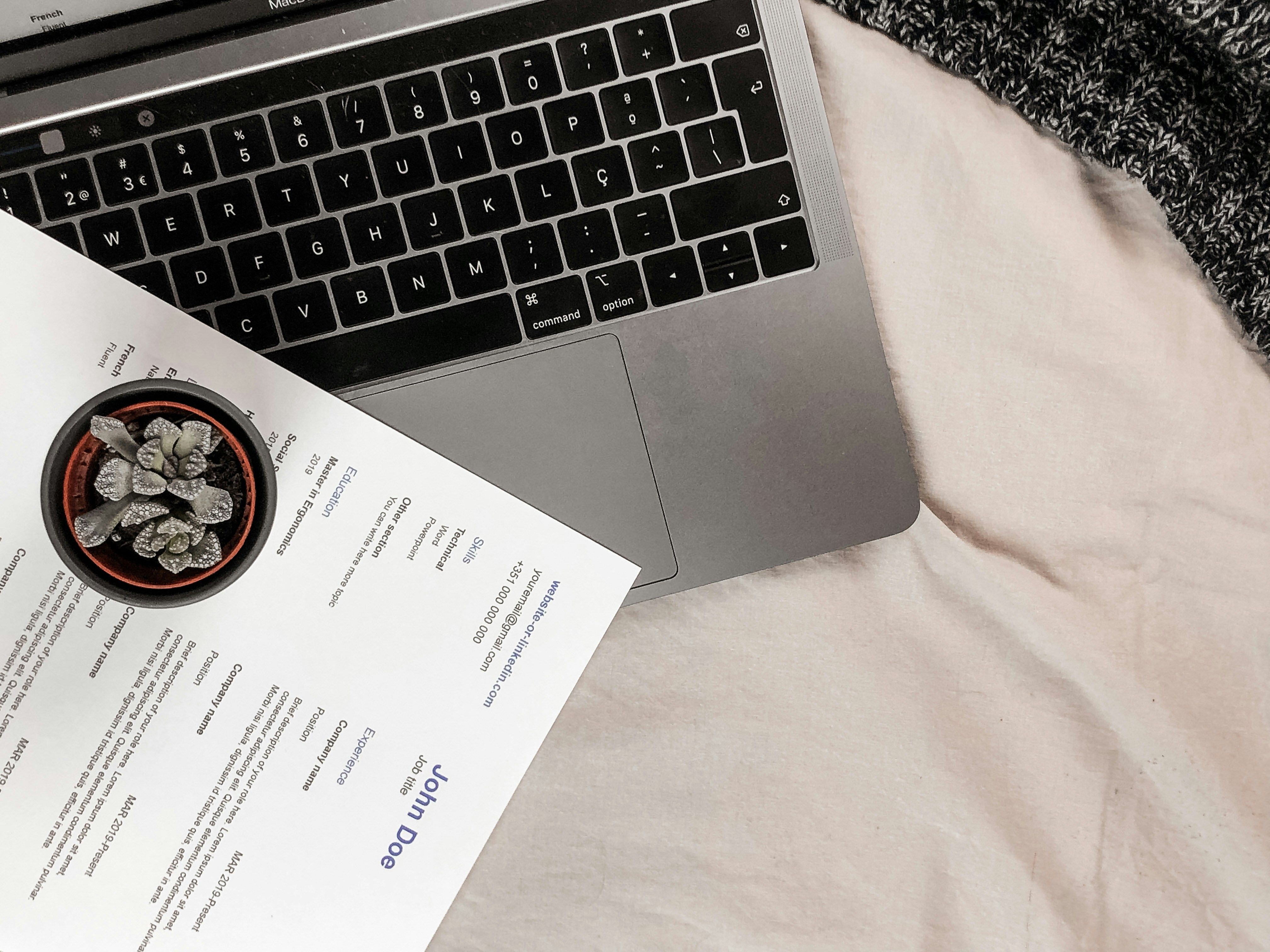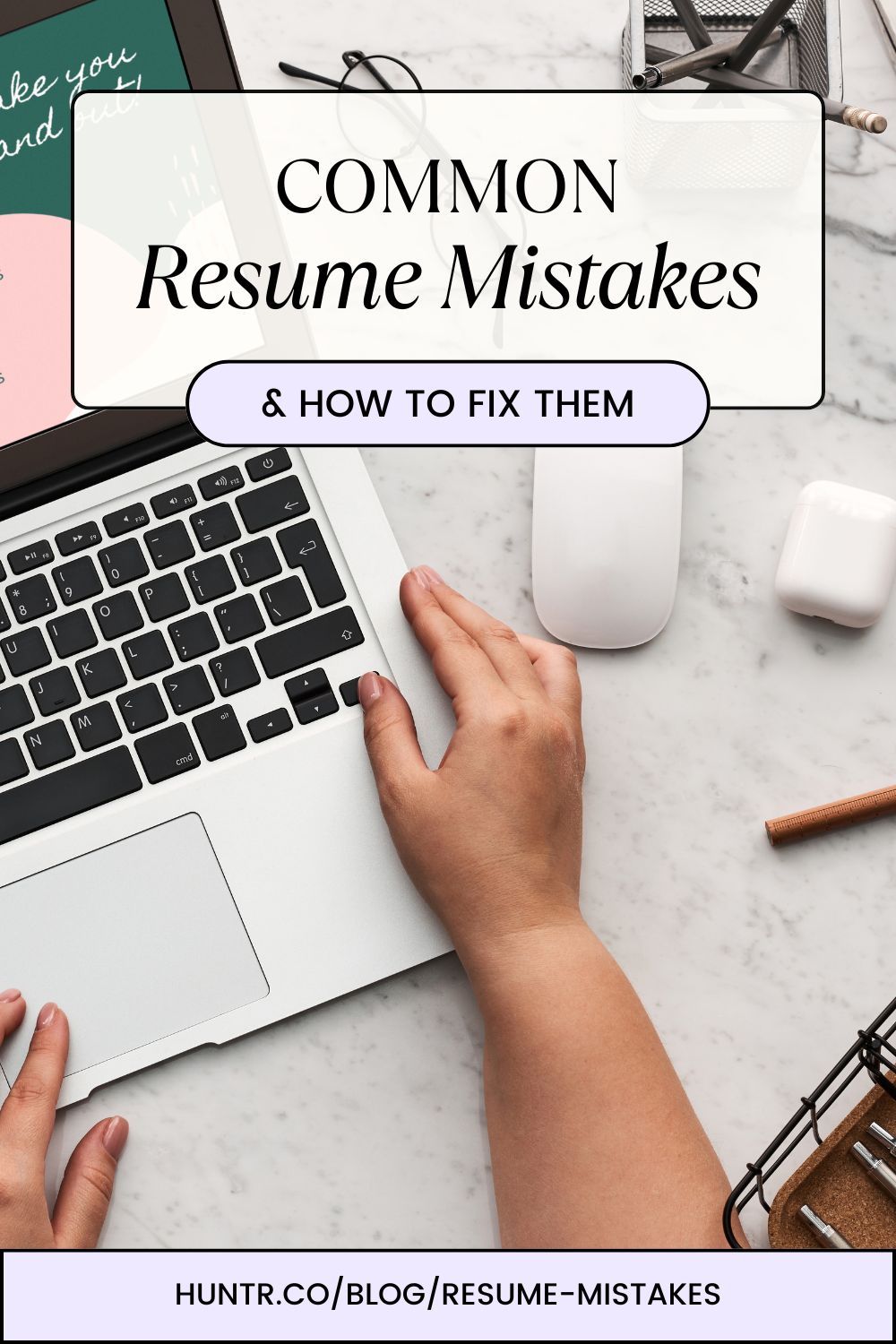Huntr Blog
27 Resume Mistakes You Might Accidentally Be Making
August 30, 2024
Writing a resume can be hard. After all, you only create one when you’re looking for a job. Unless you’re a professional designer or writer, you might find that resume building is not within your skillset. While you can always outsource resume writing to a professional, no one is going to deeply know your accomplishments and what you’ve done in a role better than you. So, it’s best for you to write your own resume, even if the task seems daunting. In this post, we’re going to share 27 common resume mistakes you might accidentally be making. Don’t worry too much if you’ve made these resume errors though, all of these things are easy to fix.
Scared of making a mistake on your resume?
Sign up for Huntr to use a Resume Checker that gives you feedback on your resume in seconds.
27 Resume Mistakes You Might Accidentally Be Making
1. Designing your own resume
Unless you’re a professional graphic designer, you probably don’t want to design your own resume. Using a resume template is likely your best bet for having a professional resume design that looks polished and is easy to read. You can sign up for Huntr to access professional resume templates and build your own resume directly in the tool to ensure a stunning resume design. You can also find templates online to ensure you find something that’s suitable for your needs. If you’re in a creative industry, you might choose a more colorful design. If you work in a more serious type of role, don’t be afraid to use a simple black and white design. Hiring managers are more interested in your resume content rather than the look of your resume design.
2. Failing to check for typos or grammatical errors
The biggest resume mistake people make is not double-checking your resume for typos and grammatical issues. Typos can often be seen as off-putting to hiring managers who are looking for people who are attentive to detail. Grammar can include things like putting a period at the end of some bullet points but not others (in general you don’t want to use periods though). It’s about creating a consistent and cohesive way of formatting your resume from a content perspective. You’ll want all resume headlines to be the same font size too. It’s these little things that put the focus on the content of your resume rather than distracting a hiring manager with small resume errors.
3. Over-optimizing your resume with AI
So, one of the biggest resume mistakes happening in 2025 is over-optimizing your resume with AI. Huntr is an AI resume builder. And while we know a little AI can help make your resume a whole lot better, you still need to have a bit of a human touch to it. Injecting your own resume accomplishments, metrics, and data will help make your resume more attractive to a recruiter. They want to know that you put effort into creating your resume. After all, if you’re just using AI to write your resume for you instead of doing it yourself, they might question your work ethic. To land this job at Huntr, I actually used a bit of AI to write my resume (You can view my resume bullet points on my LinkedIn, if you’re curious). But no one could tell. That’s the goal you should strive for when using AI. It’s okay to use AI for your resume as it can actually help you get a job, but have enough unique-to-you achievements to stand out among other candidates.
4. Stuffing your resume with keywords
It's true that you need to optimize your resume for ATS. But that doesn't mean you start stuffing keywords endlessly all over your resume. And you definitely don't want your resume to have keywords written in white font so no one can see them either. You shouldn't aim to cheat your way into getting your resume viewed because a hiring manager will notice they can't see those keywords anyways. When you tailor your resume for a job, you'll only include relevant keywords rather than all of the keywords you're qualified for. That's the best way to ensure you pass ATS while also give yourself the best chance of getting an interview.
5. Too focused on duties instead of achievements
Historically, people used to include their duties and responsibilities in a role on their resume. These days, hiring managers are looking to hire the best candidates. So, they don’t want to know what tasks you did, but how well you succeeded in your role. What were your biggest wins and accomplishments? Share them. Think through from a data perspective. Most managers are obsessed with data. Cater your accomplishments to how they operate on a day to day. Making the resume mistake of not highlighting your accomplishments will cause you to be overlooked, especially if another candidate does share their biggest achievements.

6. Forgetting to update your LinkedIn profile, too
One of the crucial resume mistakes people make is not ensuring that both their LinkedIn profile and their resume share the same information. If there are inconsistencies between your resume and your LinkedIn profile a hiring manager will notice. It might even result in a rejection. If you want to ensure your LinkedIn profile and resume are aligned, you can use Huntr's LinkedIn resume builder to import your LinkedIn information and turn it into a resume. You'll be able to edit or add information, such as removing past jobs that aren't the right fit for this role.
7. Not maintaining a standard length
It’s recommended that your resume is one page. Two at the most. You’re not supposed to include your entire work history on your resume (that’s what LinkedIn is for). When creating a resume, you should be tailoring your resume to a specific job, so you should only include relevant details to your resume. Your resume doesn’t need to have dozens of bullet points per job either. You can include 3-5 bullet points per role and include your most relevant three roles for the position. Keep it simple.
8. Adding references to your resume
One of the resume mistakes people make is adding references to your resume. This was a common practice to do in the past, but it’s now seen as outdated. References are only called if hiring managers are planning on sending you an offer or are on the fence about you. And not all employers will call your references these days either. Adding references to your resume only takes up valuable space where you can better share your professional accomplishments and work experiences. Plus, most hiring managers won’t need to see references so early on in the consideration process.
9. Failing to include a resume summary or objective
A resume summary or resume objective can be helpful at setting the tone for who you are, what your values are, and why someone should hire you. You don't need more than two or three sentences explaining this about yourself. If your summary statement is lengthy, consider running it through a summarizing tool like Editpad to obtain a concise version. Being succinct and clear will help you stand out and help ensure that the hiring manager knows why you're the best fit for the role as they start to read your resume.
10. Using the same resume for every job
Using a resume tailor is ideal when applying for jobs online. While it might be convenient to use the same standard resume for all the jobs you apply to, ATS filters might weed you out from consideration even if you are qualified for the role if you’re not using the right keywords. Every job you apply for will have different traits they’re looking for. While writing a resume and cover letter for each role can be tedious, it better positions you to be considered for a role when you call out specific experiences that the hiring manager is looking for.
11. Including outdated information
While ageism shouldn't happen during the job search, sometimes it does happen. Including outdated information on your resume can cause someone to determine your age, which shouldn't be apparent making this a bad resume mistake. For example, including tools that you used to use that no longer exist shouldn't be included on a resume. Or skills that were common a decade a go that are no longer necessary. Your education shouldn't include the year if you graduated more than ten years ago. And you should avoid using Yahoo or AOL email addresses as they're typically associated with older adults, Gmail is often the go-to email address to use.
12. Not including enough white space
You might have a ton of amazing work experience, but you got to pick the highlights for your role rather than sharing every little detail. Your resume can’t be wall to wall text. It needs to be scannable. Hiring managers are looking to quickly scan your resume. If there’s some natural white space it’ll be more visually appealing, which won’t overwhelm them when they look at your resume. However, if you stuff too much content to the page, it can be visually overwhelming, which could affect whether or not you’re considered for the role.
13. Not including accurate contact information
These days, you only need to include your name, city, phone number, and email address on your resume. Don’t include your entire mailing address as that’s an outdated practice. You’ll want to ensure that you double check your contact information to ensure it’s your current number and email address (and there’s no typos there). Last thing you want is a recruiter calling your old cell phone number and you not realizing that they tried reaching out. Your contact information is one of the most important sections of your resume, don’t make the mistake of not checking to ensure it’s up to date.

14. Including a photo
In Europe it’s a common practice to include a photo on your resume. But in the US, UK, and Australia, it’s often best not to choose resume designs that include a photo. Why? A photo could introduce bias. Some hiring managers might outright delete resumes with photos to ensure that bias isn’t introduced during the resume scanning process. While a hiring manager can look up your LinkedIn profile to find a photo of you, it’s often considered a good practice to not include a headshot on your resume when applying for jobs. For those who still prefer a polished image for online profiles, AI headshot generators offer an easy way to create a professional-looking photo that fits perfectly with a more formal resume or profile style.After: good practice to not include a headshot on your resume when applying for jobs.
15. Too many buzzwords
We’ve all seen those job postings where a hiring manager mentions wanting a rockstar (insert job title) to join their team. It makes most of us cringe. But there are buzzwords that candidates overuse that make hiring managers roll their eyes, too. Some words include: perfectionist, hard worker, go-getter, problem solver, outside the box thinker, motivated, ambitious, honest, experienced, and so on. These are just some of the most common ways people try to position themselves but it winds up sounding generic because you end up seeing it on every resume. Choose words that accurately reflect who you are as a person, that really showcase your unique value in a work environment.
16. Using unprofessional fonts
One of the most common resume mistakes people make is choosing the wrong font. Typically, Serif fonts are the easiest fonts to read, but these days most people opt for Sans Serif fonts for a more modern look. When it comes to resumes, scannability is everything. You don’t want to throw in a cursive font like Comic Sans, Pacifico, or Lobster. Keep it simple. Stick with fonts that people expect to see like Arial, Garamond, Calibri, Helvetica, Times New Roman, Lato, Georgia, or Avenir. Pick a font that’s easy to read.
17. Overexplaining details
Your resume should include all key details in one-line bullet points. But if you really want to explain something on your resume, your best bet is to work on a cover letter. A cover letter can be used to explain gaps and go into detail about certain accomplishments. To avoid overexplaining details on your resume, write bullet points in the STAR format.
18. Including your desired salary
The salary you’re aiming for plays such a crucial part in the decision-making process of whether or not you accept a role. And while talking about salary expectations in a first interview is often a standard thing to do, you don’t want to put your desired salary on your resume. This resume mistake can be off-putting to a hiring manager. Talking about money before even meeting a person can be a bit of a taboo subject. It’s often best to save the money talk for the end of the first interview. Give yourself the opportunity to position yourself as a high caliber hire before diving into what your salary expectations are.
19. Creating an incorrect file name
When you’re creating multiple resumes for different employers or job types, you really want to triple check every detail. Including that file name. You don’t want to send the wrong file name title to an incorrect employer. Always, always, always, check the file name before uploading the resume to a job site. Aim to keep the file name simple such as “(Name) - (Job title) Resume” or “Nicole Martins Ferreira - Product Marketing Manager Resume.” Just keep it simple. Alternatively you can format it based on the employer name, such as “(Name) - (Employer) Resume” or “Nicole Martins Ferreira - Huntr Resume.”

20. Disclosing personal information
One of the biggest resume mistakes people make is oversharing personal information that isn’t directly related to their work. For example, don’t include political affiliations, philosophical beliefs, whether or not you’re a parent, marital status, sexual orientation, and so on. Keep the focus on why you’re qualified for the job instead of oversharing personal information.
21. Having an unprofessional tone
There are some things that may be inappropriate or unprofessional to put on a resume. You shouldn't use sass, vulgarity, or inappropriate messaging on your resume. Avoid using an aggressive tone on your resume to create an image of yourself. And eliminate any inappropriate language on your resume. You also don't want to make jokes on your resume. It may come across as unprofessional or that you don't take the role seriously. Unless the company has a quirky sense of humor, avoid anything that may be perceived as unprofessional.
22. Including irrelevant skills or hobbies
One of the resume faux pas is including too many irrelevant skills or hobbies. You might share some hobbies based on your personal interests to showcase how well-rounded you are. However, you should save the topics of personal interest for interview questions about hobbies. Focus on including the skills and resume hobbies and interests that showcase how qualified you are for a job. What are the skills you’ve developed that helped make you great for this potential new role? What hobbies have you dived into to help you that’ll help you better understand what you need to know about this new job? Share those on your resume. Don’t make the resume mistake of including things that don’t directly align with the role you’re applying for. You can use Huntr’s resume skills generator to find relevant skills for the role you’re in.
23. Lying on your resume
Lying on your resume can be illegal. Especially if you’re saying you’re qualified for a job you don’t actually have any certifications or credentials for. For example, you can’t work as an engineer without an engineering degree. And you will go to jail if you claim to be a doctor but aren’t actually licensed to practice in the country you’re in. While these are extreme cases, you don’t want to make the resume mistake of lying. Always have data or proof to back up your claims.
24. Not using a professional email address
One of the biggest resume mistakes you can make is not thinking through how you’re being perceived in the first impression. Your email address should literally just be your name, maybe a number at the end if you have a common name. But beyond that, you shouldn’t have any unprofessional email addresses. Keep it simple. Understand that the person on the other end is being paid to judge your qualifications, and any distractions could land you in the reject pile.
25. Unexplained gaps
With all the job layoffs, having a gap on your resume is more common than ever before. You don’t need to go into detail about it, or you can choose to elaborate on it in a cover letter. But explaining a gap on a resume can help you out. After all, if you don’t explain a gap, a hiring manager is going to assume the worst. You’ll want to clarify that you were on parental leave, sick leave, caring for a family member, or laid off from a role. You don’t need to go in detail, just a small note to explain your absence from the workforce for a while.
26. Being too vague
One of the resume mistakes to avoid making is being too vague. You want to thoroughly explain what you achieved and how you achieved it. For example, “Wrote blog posts that generated over 10 million views via content distribution, SEO, and content freshness.” By explaining how you achieved a goal it helps hiring managers see what other skills you might have that they’re looking for. By elaborating on how you achieved something, you’ll have an opportunity to highlight some more skills or shine a light on your expertise.
27. Not using a resume builder
One of the biggest resume mistakes you can make is not using a resume builder like Huntr. Huntr provides beautiful resume templates that you can modify with your own personal work experience, use some AI to help ensure you’ve covered all the essentials, tailor your resume to specific job postings with its job description keyword finder so you can include the right keywords, and so much more. You can instantly generate AI cover letters, try out AI mock interview questions, and use AI to write your emails when at different interview stages. Trying to do these things manually will eat up more of your time and make you less effective. Having the right tools, like Huntr, can allow you to land more interviews, faster.
Conclusion
Making these resume mistakes can lead to a fewer number of interviews when you really are a great candidate for the job. If you're currently working on your resume, you can use Huntr to build your resume, get feedback on it, tailor your resumes for jobs, and quickly generate relevant cover letters. To start working on your resume, sign up for Huntr today.

Get More Interviews, Faster
Huntr streamlines your job search. Instantly craft tailored resumes and cover letters, fill out application forms with a single click, effortlessly keep your job hunt organized, and much more...
AI Resume Builder
Beautiful, perfectly job-tailored resumes designed to make you stand out, built 10x faster with the power of AI.
Next-Generation Job Tailored Resumes
Huntr provides the most advanced job <> resume matching system in the world. Helping you match not only keywords, but responsibilities and qualifications from a job, into your resume.
Job Keyword Extractor + Resume AI Integration
Huntr extracts keywords from job descriptions and helps you integrate them into your resume using the power of AI.
Application Autofill
Save hours of mindless form filling. Use our chrome extension to fill application forms with a single click.
Job Tracker
Move beyond basic, bare-bones job trackers. Elevate your search with Huntr's all-in-one, feature-rich management platform.
AI Cover Letters
Perfectly tailored cover letters, in seconds! Our cover letter generator blends your unique background with the job's specific requirements, resulting in unique, standout cover letters.
Resume Checker
Huntr checks your resume for spelling, length, impactful use of metrics, repetition and more, ensuring your resume gets noticed by employers.
Gorgeous Resume Templates
Stand out with one of 7 designer-grade templates. Whether you're a creative spirit or a corporate professional, our range of templates caters to every career aspiration.
Personal Job Search CRM
The ultimate companion for managing your professional job-search contacts and organizing your job search outreach.

